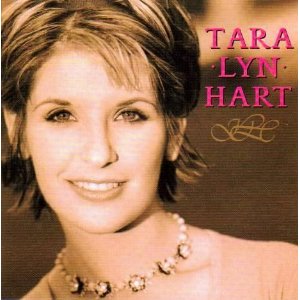• Tara Lyn Hart: Tara Lyn Hart, Epic, 2000.
ON HER second disc, Tara Lyn Hart is given the whole Nashville treatment. Winner of this year’s Canadian Country Music Association Rising Star Award (in addition to two Juno nominators and five more CCMA nominations) Hart has a solid, likable delivery, but this is not the forum she needs.
Utilizing half a dozen producers, a variety of studios and musicians, she’s too often dwarfed by unsympathetic production. With appropriate accompaniment — imagine a Buddy Miller production — a track like ‘Love Oughta Work That Way’ could be something special, instead of rife with clichés. Some tracks work better than others — and fans of the genre could do far worse — but throughout the listener is left wishing there was more of Hart and less of the supporting cast.
In what can only be deemed an encouraging sign, Hart has expressed frustration at the way things are done in Nashville, and recently moved back to Canada.
She’s made no secret of the fact she’s a Christian and, like Paul Brandt (this years’ recipient of CCMA Male Artist of the Year award), she’s an excellent example of the concepts set forth in Bob Briner’s Roaring Lambs book, of Christians working outside of the CCM ghetto.
• Hank Thompson: Seven Decades, Hightone, 2000.
A bona fide country music legend, Hank Thompson is responsible for a number of innovations. He was the first act — in any genre — to carry full sound and lighting systems on tour, and a pioneer in stereo recording. During the late ’40s, he was the first country artist to play ballrooms accustomed to crooners and big bands. More importantly, he delivered the goods.
With back-up from his Brazo Valley Boys, Thompson’s mix of honkytonk and western swing netted record sales in excess of 60 million. His single, ‘The Wild Side of Life,’ spent 15 weeks in the peak position of the Billboard country charts in 1952.
Now in his seventh decade of performing, Thompson continues to play over 100 shows a year. His last effort, Hank Thompson and Friends (Curb, 1997) was a misfire, coupling him with current country artists like Brooks and Dunn.
This time out it’s pure Hank, with his signature sound of steel guitar and twin fiddles front and centre. In addition to half a dozen originals, Thompson includes effective reads on seven additional tracks. Particularly effective are The Kingston Trio’s ‘Scotch and Soda’; and ‘Dinner For One,’ an obscure Nat King Cole track. A fine addition to a formidable catalogue.
• Big Sandy & His Fly-Rite Boys: Night Tide, Hightone, 2000.
• Ray Condo & His Ricochets: High & Wild, Joaquin, 2000.
Big Sandy and Ray Condo remain gloriously unaffected by current trends as they keep the western swing flame alive. Both add large doses of rockabilly into the mix, along with sufficient variety to render simple categorization impossible. Sandy’s relaxed, sweet voice, and the smooth playing of the Fly-Rite Boys, contrasts with Condo’s frantic hillbilly swagger and the Ricochets’ aggressive approach — succinctly described by Condo as “comedy and western.”
Over the last decade, Big Sandy (aka Robert Williams) has amassed an impressive catalogue of original songs that sound vintage, but are never calculated. As usual, there’s plenty of bouncy tempos, but on Night Tide Williams tackles more serious subject matter, including death, depression and alcoholism. ‘Between Darkness and Dawn’ is a tale of regret: “When did I fall from His hand into this world so strange? / Though I try it seems that I’m too weak to make the change / I’m just a sinner, I sing a sinner’s song … Like a fool I gambled on the women and wine / and when I think of what I’ve lost, I almost lose my mind / my wife, my family, my everything is gone.” Williams is in fine voice, and the Fly-Rite Boys are playing as strong as ever.
Condo and the Ricochets’ repertoire is made up almost exclusively of covers. Sampling from a wide range of sources, they make everything their own. As a former member of the band myself, it’s nice to see original drummer Steve Taylor back on board for this disc. Steve Nikleva (guitar) and Jimmy Roy (steel) have a sound that brings to mind Speedy West and Jimmy Bryant on overdrive. Ray is on form as usual, offering a unique persona that’s equal parts Hank Williams and Johnny Rotten. A highlight this time out is a rockin’ take on ‘Parchman Farm.’
• Charles Wolfe: In Close Harmony — The Story of the Louvin Brothers, University Press of Mississippi, 1996.
Arguably the greatest harmony duo in the history of country music, the Louvin Brothers’ high lonesome harmonies left their mark on the Everly Brothers, the Byrds, Emmylou Harris, and pretty much everyone else who’s ever sung country or rock. It’s no surprise that Elvis claimed they were his favorite duo.
In addition to singing and playing (Ira played mandolin, Charlie guitar), the brothers wrote the bulk of their material, including memorable titles like ‘Satan is Real,’ ‘The Family that Prays (Shall Never Part),’ ‘The Christian Life’ (covered by the Byrds on Sweetheart of the Rodeo), ‘Are You Afraid to Die’ and ‘Thank God for My Christian Home.’
Performing gospel and sentimental songs on local radio from the early ’40s, by 1955 they had a string of hit records and were members of the Grand Ole Opry. Ira was ridden with guilt over an earlier decision not to follow a calling to be a preacher. Two years after the duo broke up in 1963, Ira was dead — killed with his wife, when their car was struck by a drunk driver. This is a fascinating story, documenting the brothers’ struggle to find acceptance. It could have been treated as gossip, but is handled here with honesty and respect.
© John Cody 2000
